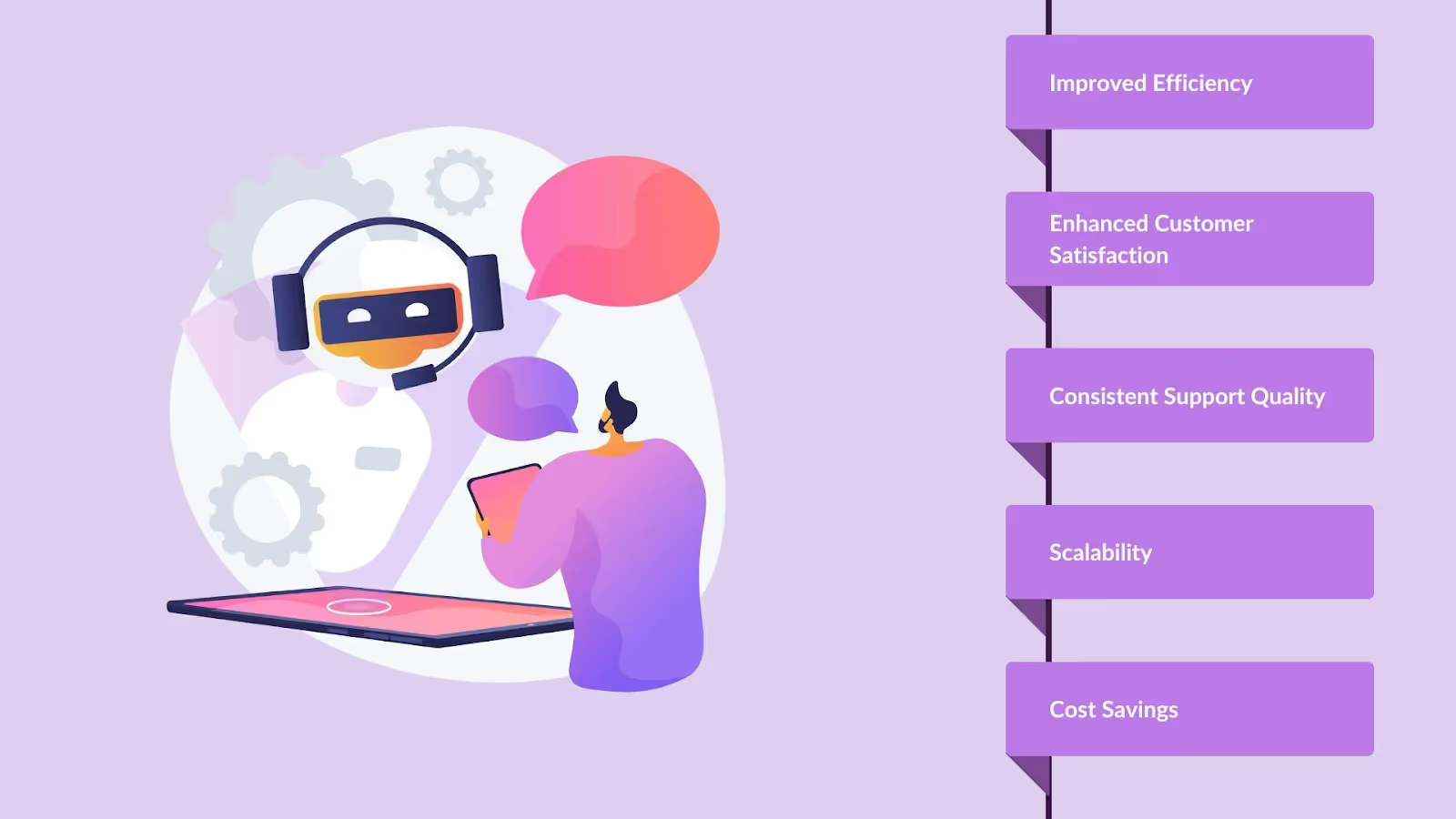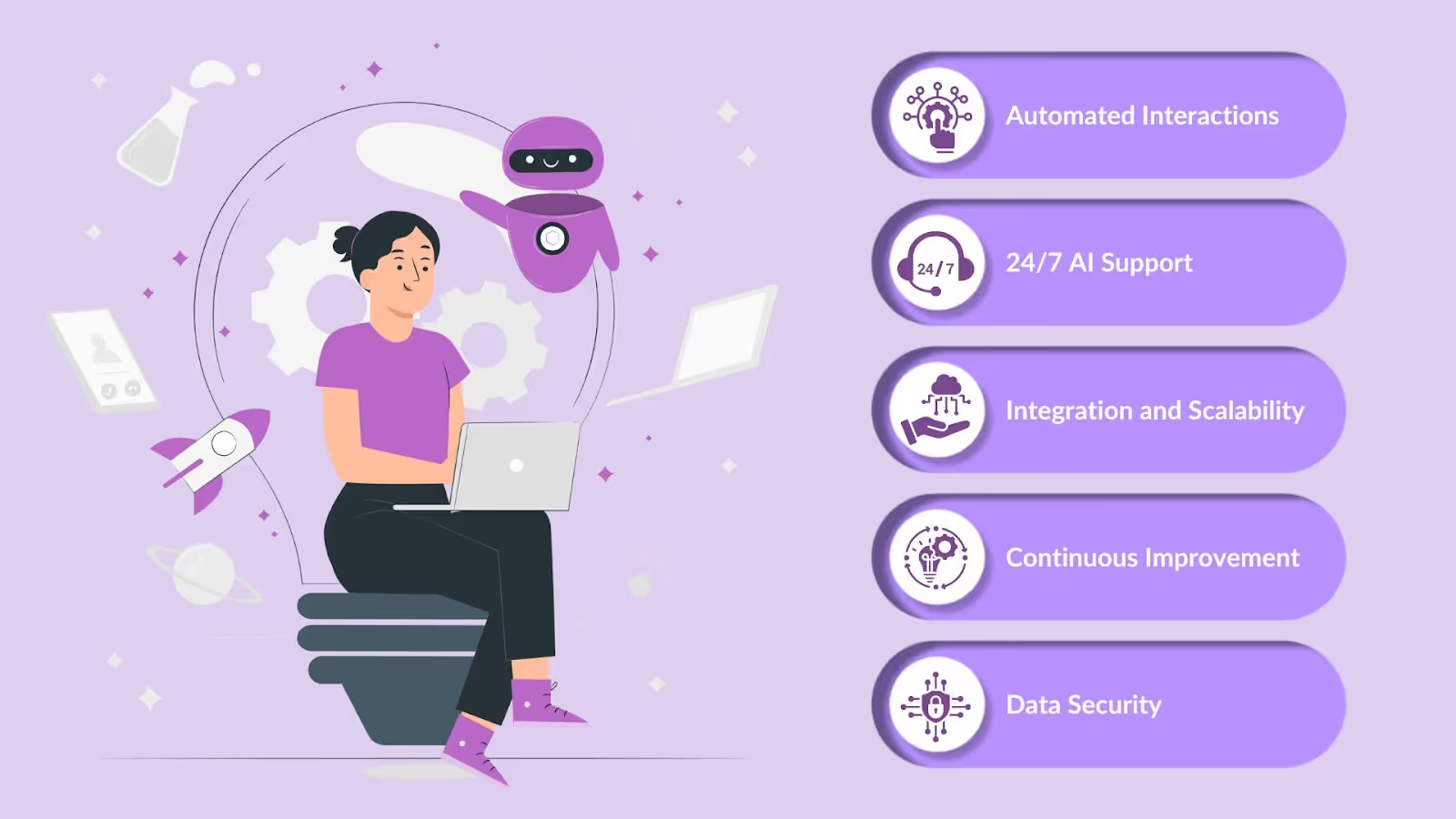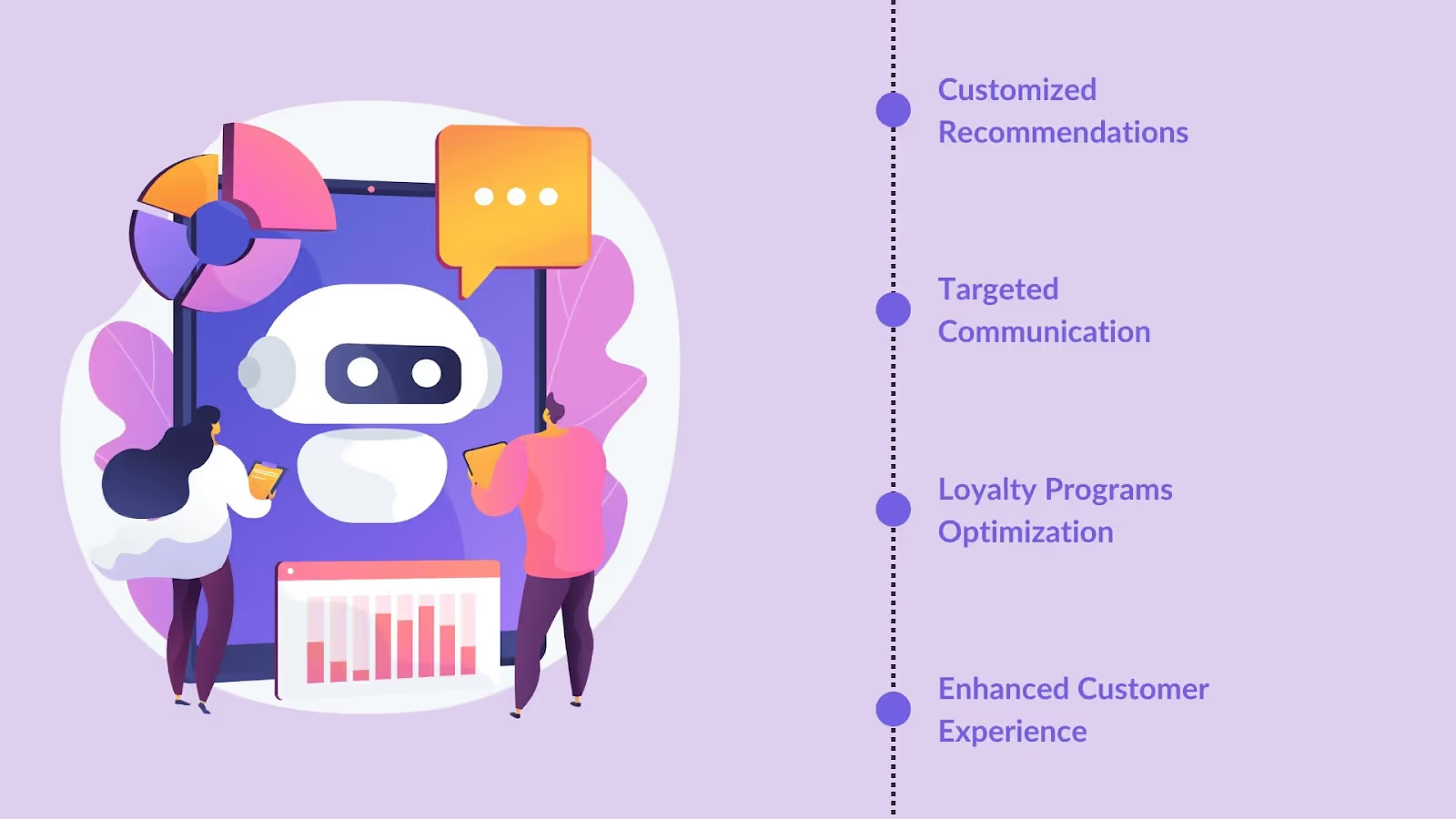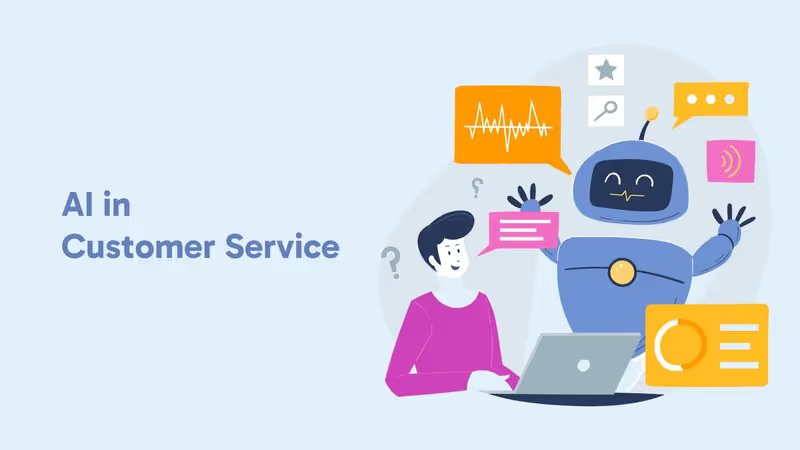What is Generative AI?
Generative AI means systems that can generate text, images, or other media in response to prompts. These systems use machine learning models to create content that looks and feels like human creativity. In customer support, generative AI can auto-respond, generate knowledge base articles, and even simulate human-like conversations.
Use Cases of Generative AI for Customer Support
Use Case 1: Automated Response Generation
Generative AI for customer support can answer customer queries and provide accurate answers in seconds. By automating answers, businesses can ensure customers get fast and consistent information and speed up customer support operations. This also takes the load off human agents so they can focus on tasks that require more complex problem-solving.
Example: A leading e-commerce platform, Shopify, uses generative AI to answer customer questions. The AI answers common questions about order status, product details and return policy, so customers wait less, and human agents can focus on more complex issues. [Source]
Use Case 2: Knowledge Base Article Creation
Having an up-to-date knowledge base is crucial for customer support. Generative AI can generate articles based on customer queries and feedback so the information is always up-to-date and relevant. This continuous update process not only provides customers with the most accurate information but also enables them to find answers on their own and reduce the number of support requests.
Example: Microsoft uses generative AI to update its massive knowledge base for products like Office 365 and Windows. The AI analyzes customer feedback and queries to generate new articles and update existing ones so users always have the latest information. [Source]
Use Case 3: Personalization of Customer Interactions
Generative AI for customer support can analyze customer data to personalize interactions. This personalization improves the customer experience and builds stronger relationships. By personalizing interactions, businesses can make customers feel heard and understood and get higher satisfaction and loyalty. Personalization also means customizing communication styles and channels so customers get support in the way they want.
Example: Sephora uses generative AI to personalize its online customer interactions. The AI analyzes purchase history and browsing behavior to recommend products and offer personalized beauty tips. [Source]
Use Case 4: Sentiment Analysis and Response Adaptation
Customer emotions matter. Generative AI for customer support can analyze the sentiment in customer messages and respond accordingly so you can be empathetic and relevant. By responding to the emotional tone of the customer, you can turn negatives into positives and build trust and reputation. This means customers feel heard and understood and have a better relationship with your brand.
Example: Bank of America uses generative AI to analyze customer sentiment in real-time during chat. If the AI detects frustration or dissatisfaction, it responds more empathetically and solution-focused. [Source]
Use Case 5: Multilingual Support
Generative AI for customer support can translate and respond in multiple languages, breaking down language barriers and supporting a global customer base. Supporting multiple languages not only increases accessibility but also shows customers you value their diverse needs, and have a more inclusive customer service. This is key for businesses looking to go global and support a diverse customer base.
Example: Airbnb uses generative AI to support over 20 languages. The AI translates customer queries and responds in the customer's language, so communication is clear and effective. [Source]
Use Case 6: Proactive Customer Engagement
Generative AI for customer support can spot patterns in customer behavior and proactively reach out with helpful information or offers to increase engagement. This proactive approach also helps identify potential issues before they escalate so you can resolve them faster and improve customer satisfaction.
Example: Amazon uses generative AI to analyze browsing behavior and purchase history to send personalized recommendations and special offers to customers. [Source]
Use Case 7: Virtual Assistants and Chatbots
Generative AI for customer support can power virtual assistants and chatbots, providing support to customers 24/7. These assistants can handle everything from simple FAQs to complex troubleshooting. Chatbots with generative AI can also learn from interactions, so they get better and better. This means customers get instant support at any time and overall efficiency increases.
Example: H&M uses a generative AI-powered chatbot to help customers with product searches, order tracking, and returns. [Source]
Now, let’s explore how this technology can also make your ticket management a breeze.
Use Case 8: Automated Ticket Routing
Generative AI for customer support can route incoming tickets to the right departments or agents so that customer issues are handled efficiently. By getting tickets to the right team or agent, businesses can resolve issues faster, shorter customer wait times, and higher satisfaction.
Example: Zendesk uses generative AI to categorize and route tickets based on the customer query. [Source]
Use Case 9: Content Summarization
Generative AI for customer support can summarize long support conversations so agents can review and get up to speed on previous conversations. This speeds up follow-up conversations. By giving agents a quick recap of previous conversations, they can deliver more informed and faster support and better customer experiences.
Example: Salesforce uses generative AI to summarize long customer interaction history into a summary for support agents. [Source]
Use Case 10: Real-Time Assistance for Agents
Generative AI for customer support can provide real-time suggestions to human agents during live conversations so they can respond better and more accurately. This ensures agents have the information at their fingertips to resolve issues fast and accurately. Real-time assistance not only increases agent productivity but also the quality of customer conversations.
Real-Life Example: AT&T uses generative AI to assist customer service agents during live calls. [Source]
Having explored various use cases, let's now delve into the overall benefits that generative AI brings to customer support.
Benefits of Generative AI for Customer Support

Transitioning from use cases to benefits, let's delve into how generative AI tangibly improves customer support operations.
1. Improved Efficiency
Generative AI automates the boring stuff so human agents can focus on the hard stuff. This means overall efficiency and cost savings. You can handle more volume without sacrificing support quality.
2. Enhanced Customer Satisfaction
Faster response times and personalization mean customers get great support, which equals higher satisfaction and loyalty. Happy customers become repeat buyers and brand advocates.
3. Consistent Support Quality
Generative AI gives you consistent answers, so all customers get accurate and reliable info, no matter the time or channel. This consistency builds trust and reliability, so customers know they can expect the same level of service every time.
4. Scalability
As you grow, so does the volume of customer support. Generative AI can scale easily without sacrificing quality. This is crucial for businesses looking to expand their customer base and maintain high support standards.
5. Cost Savings
Automate and reduce human resources and you'll save costs on customer support. Put that back into other parts of the business and grow and innovate.
While the benefits are impressive, it's crucial to understand the challenges that come with implementing generative AI for customer support.
Challenges and Considerations
While generative AI for customer support offers numerous benefits, there are challenges to consider:
1. Data Privacy and Security
Customer data is sacred. Businesses must make sure their generative AI is compliant with data regulations and has high security. That means implementing robust security measures to prevent data breaches and unauthorized access to sensitive customer info.
2. Maintaining Human Touch
Generative AI can simulate human conversations, but the human touch is still important in customer support. Balancing automation with human empathy is key. Businesses should always have an option for customers to talk to a human agent when needed.
3. Continuous Improvement
Generative AI systems need to be updated and trained regularly. Continuous monitoring and improvement is key to high performance. Businesses should invest in ongoing training and development to keep their AI up to date with the latest.
Despite these challenges, solutions like Nurix can help you navigate and leverage AI for customer service excellence.
Leveraging Nurix Generative AI Customer Service Tools

Nurix offers tailored AI solutions to transform customer interactions across chat, email, and voice channels.
- Automated Interactions: Streamline processes across chat, email, and voice channels, allowing for efficient handling of routine tasks and freeing up human resources for complex issues.
- 24/7 AI Support: Offer consistent, real-time assistance that enhances customer satisfaction by ensuring support is always available, improving engagement and response times.
- Integration and Scalability: Seamlessly integrate with existing systems, allowing businesses to scale operations effectively and accommodate growth without sacrificing service quality.
- Continuous Improvement: The AI learns from each interaction, continually refining its performance to provide more accurate and personalized support.
- Data Security: Prioritizes secure data handling and compliance with industry standards, ensuring customer information is protected.
Ready to take the plunge? Here's a step-by-step guide to implementing generative AI for customer support operations.
Implementing Generative AI: A Step-by-Step Guide
Successfully implementing generative AI for customer support requires a structured approach. Here's a step-by-step guide to help businesses integrate AI effectively.
- Assessment: Identify areas of customer support that can use AI. Look at what's repetitive or time-consuming and where AI can add the most value to increase efficiency and customer happiness.
- Integration: Integrate AI with your existing systems. Make sure the AI tools can talk to your current software and databases so data flows smoothly and operations are consistent.
- Training: Train the AI on customer data. This means feeding the AI historical data and feedback so it can learn and adapt to your specific customer service needs.
- Deployment: Roll out AI in phases, starting with non-critical areas. This phased approach allows for testing and refinement, minimizes disruption, and ensures the AI works before you go live.
- Monitoring: Monitor the AI and adjust as needed. Review the AI's performance, gather feedback, and update the system to keep it getting better.
Overcoming Challenges in AI Adoption
Adopting generative AI for customer support comes with a set of challenges. Addressing these obstacles effectively ensures a smoother transition and maximizes the benefits of AI in customer support.
- Data Privacy: Implement data protection. Comply with data privacy regulations and have strong security protocols in place to protect customer data from breaches and misuse.
- User Training: Train staff to use the AI tools. Provide comprehensive training programs so employees know how to use AI in their daily tasks so they can work alongside AI seamlessly.
- Balancing Automation and Human Touch: Ensure a balance of AI and human interaction. While AI can do many things, human interaction is key for complex issues and building emotional connections with customers.
The Role of AI in Enhancing Customer Loyalty

Personalized experiences powered by generative AI for customer support can significantly increase customer retention and loyalty. By understanding customer preferences and behavior, AI can provide tailored support that fosters long-term relationships.
- Customized Recommendations: AI looks at past purchases and browsing history to offer personalized product recommendations. Customers feel valued and understood and are more likely to buy again.
- Targeted Communication: Generative AI can tailor marketing messages and support communications to individual customer preferences and behavior. Personalized messages resonate more with customers and build a stronger bond with the brand.
- Loyalty Programs Optimization: AI can optimize loyalty programs by predicting which rewards will appeal to different customer segments. The targeted approach encourages continued engagement and increases customer loyalty.
- Enhanced Customer Experience: By providing real-time personalized support, AI ensures each customer interaction is relevant and efficient. Happy customers are more likely to stay loyal and recommend the brand to others.
Ethical Considerations in AI-Driven Customer Service
As generative AI for customer support becomes increasingly integrated into customer service, it's crucial to address the ethical implications. Here are key considerations to ensure ethical AI practices.
- Transparency: Be clear about AI in customer interactions. Tell customers when they're talking to AI and how their data is being used so they can trust and be open.
- Bias: Make sure AI systems are bias-free. Audit and update AI algorithms regularly to prevent biased outcomes and fair treatment for all customers regardless of background or characteristics.
- Accountability: Have protocols in place for when AI goes wrong. Have clear processes for dealing with mistakes or malfunctions in AI so accountability and quick resolution keep customers trusting.
The Future of Customer Interaction
Generative AI for customer support is not just a trend; it's shaping the future landscape of customer service and business communication. Businesses leveraging AI will be at the forefront of innovation, providing seamless and efficient customer interactions.
- Enhanced Customer Insights: Gen AI for customer support analyses vast amounts of customer data and gives you deep insights into customer behavior and preferences. You can tailor your services and products to meet customer needs better.
- Real-Time Personalization: AI-powered customer service can adapt in real-time to provide personalized interactions based on the customer's current context and past interactions. More meaningful and engaging customer experiences.
- Proactive Support: By predicting customer needs and issues before they happen, generative AI lets you offer proactive support and resolve potential issues before they hit the customer. A proactive approach means higher customer satisfaction and loyalty.
Conclusion
Generative AI for customer support is changing the way businesses interact with customers. From automated to personalized interactions, the benefits are many. By using this technology, you can increase efficiency, customer satisfaction, and cost savings.
Integrating gen AI for customer support into your strategy will position your business at the forefront of innovation, ensuring you stay ahead in the competitive landscape.
Ready to transform your operations? Leverage Nurix's powerful AI tools to elevate your customer service strategy. Don't wait—embrace the future of customer support with Nurix AI and lead the way in your industry. Discover more at Nurix AI.










